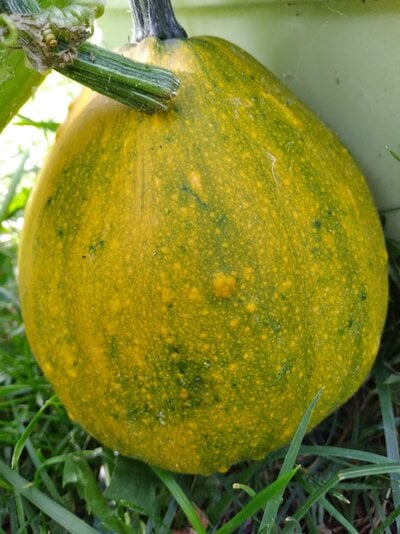Mountainbluebird
Chirping
Hello, greenthumbs!
I started a garden in a new area this spring, after clearing out an old shed. It had a rough start due to hot, intesne winds for a solid week when everything had JUST started to take off. Most shriveled up and died, so I was ready to give up. But shortly after, I finally got some rain and dozens of little squash babies started popping up all over (in places I hadn't planted any)!
But shortly after, I finally got some rain and dozens of little squash babies started popping up all over (in places I hadn't planted any)!
Now, this wasn't a complete surprise, as I used my compost in the beds, which likely contained seeds from a few squashes that rotted and weren't suitable for feeding to my chickens. I decided to let them take over the garden so I could at least produce something this year.
Here is the fun part! Many of the plants are developing fruit that I absolutely do not recognize. I'm talking all kinds of shapes and sizes, textures and colors.

The seeds that made it into the compost would have only come from acorn squash, spaghetti squash, and butternut squash, which I had bought from the grocery store or local farmer's markets, as well as a monster zucchini from last year's garden that managed to stay hidden until too late. I've been scouring the internet for answers, and it looks like all the aforementioned besides butternut squash can cross-pollinate (including pumpkins and gourds) to create hybrids.

But the absolute diversity of these fruit is so amazing! It makes me wonder if there is more going on here.. such as old seeds that had been stored in shed years and years ago (the original foundation of the house on this property is a hundred years old). I also have found shards of pottery while tilling the area. I have no idea the age, but do know the land I am on was cared for by Ute people. I've heard seeds can wait ages for the right conditions to germinate. But through hundreds of seasons under hard packed clay? Is something like that possible?

It has been so much fun trying out some of these mysteries. Some seem more like summer squashes, and the chickens have gone to town on all parts of them, including the rind. Others are more like winter squash and they only went for the seeds. I tried cooking one up and it had a mild but pleasant taste! The shape and texture led me to guess a hybrid between spaghetti and acorn squash. I'm a bit hesitant to try eating the ones that look more like pumpkins
Does anybody else have any experience with this kind of thing? Theories? Thoughts? Expertise?
I'd love to see volunteer compost plants and mysteries of yours as well! Or if you simply have plants that you're proud of. Gardening is such a joy!
I started a garden in a new area this spring, after clearing out an old shed. It had a rough start due to hot, intesne winds for a solid week when everything had JUST started to take off. Most shriveled up and died, so I was ready to give up.
 But shortly after, I finally got some rain and dozens of little squash babies started popping up all over (in places I hadn't planted any)!
But shortly after, I finally got some rain and dozens of little squash babies started popping up all over (in places I hadn't planted any)!Now, this wasn't a complete surprise, as I used my compost in the beds, which likely contained seeds from a few squashes that rotted and weren't suitable for feeding to my chickens. I decided to let them take over the garden so I could at least produce something this year.
Here is the fun part! Many of the plants are developing fruit that I absolutely do not recognize. I'm talking all kinds of shapes and sizes, textures and colors.

The seeds that made it into the compost would have only come from acorn squash, spaghetti squash, and butternut squash, which I had bought from the grocery store or local farmer's markets, as well as a monster zucchini from last year's garden that managed to stay hidden until too late. I've been scouring the internet for answers, and it looks like all the aforementioned besides butternut squash can cross-pollinate (including pumpkins and gourds) to create hybrids.
But the absolute diversity of these fruit is so amazing! It makes me wonder if there is more going on here.. such as old seeds that had been stored in shed years and years ago (the original foundation of the house on this property is a hundred years old). I also have found shards of pottery while tilling the area. I have no idea the age, but do know the land I am on was cared for by Ute people. I've heard seeds can wait ages for the right conditions to germinate. But through hundreds of seasons under hard packed clay? Is something like that possible?
It has been so much fun trying out some of these mysteries. Some seem more like summer squashes, and the chickens have gone to town on all parts of them, including the rind. Others are more like winter squash and they only went for the seeds. I tried cooking one up and it had a mild but pleasant taste! The shape and texture led me to guess a hybrid between spaghetti and acorn squash. I'm a bit hesitant to try eating the ones that look more like pumpkins
Does anybody else have any experience with this kind of thing? Theories? Thoughts? Expertise?
I'd love to see volunteer compost plants and mysteries of yours as well! Or if you simply have plants that you're proud of. Gardening is such a joy!





